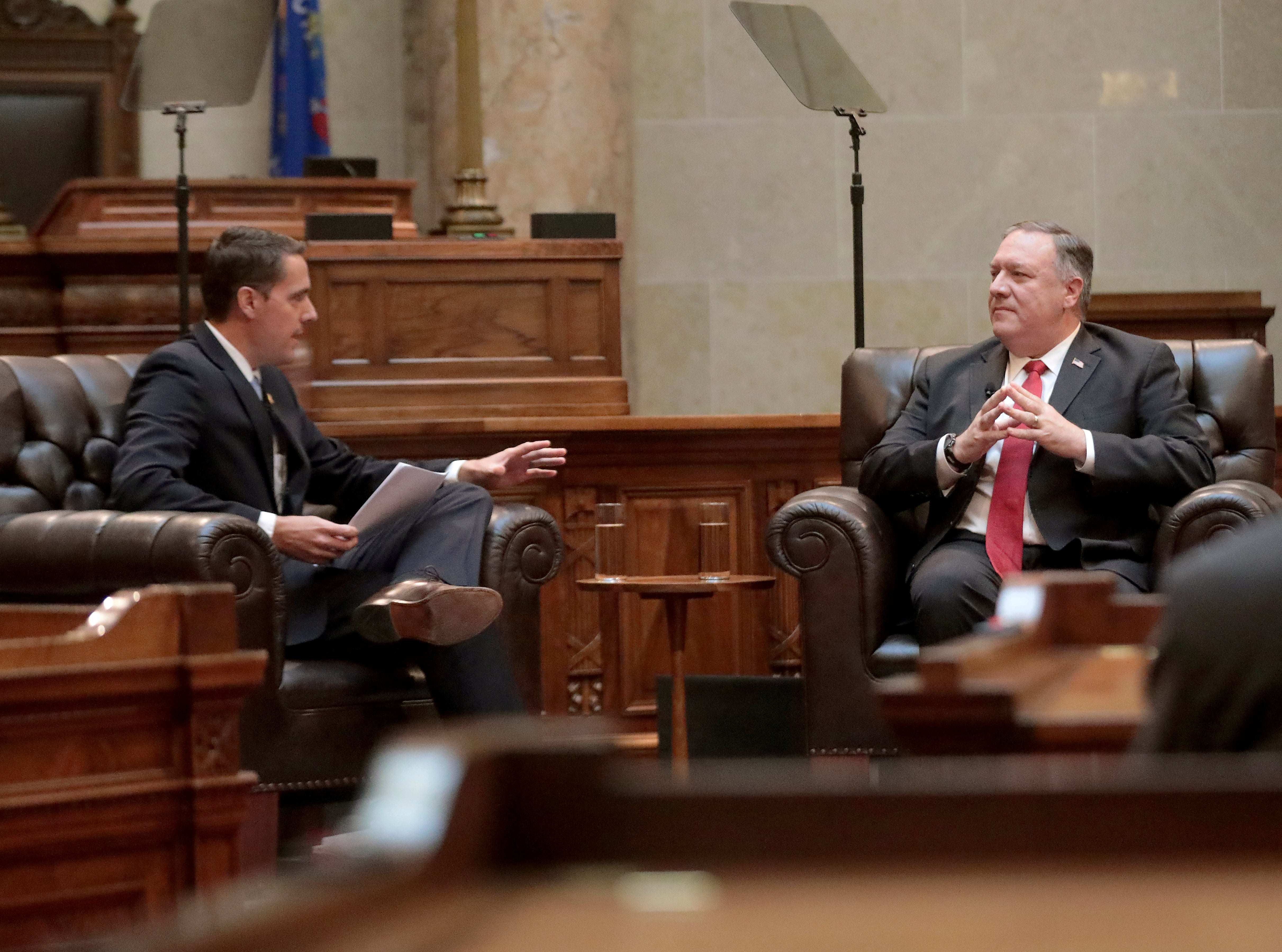Pompeo warns of China influence in state, local governments
U.S. Secretary of State Mike Pompeo warns that China is aggressively attempting to influence state and local governments, delivering the message in the presidential battleground state of Wisconsin

Your support helps us to tell the story
From reproductive rights to climate change to Big Tech, The Independent is on the ground when the story is developing. Whether it's investigating the financials of Elon Musk's pro-Trump PAC or producing our latest documentary, 'The A Word', which shines a light on the American women fighting for reproductive rights, we know how important it is to parse out the facts from the messaging.
At such a critical moment in US history, we need reporters on the ground. Your donation allows us to keep sending journalists to speak to both sides of the story.
The Independent is trusted by Americans across the entire political spectrum. And unlike many other quality news outlets, we choose not to lock Americans out of our reporting and analysis with paywalls. We believe quality journalism should be available to everyone, paid for by those who can afford it.
Your support makes all the difference.U.S. Secretary of State Mike Pompeo warned Wednesday that China was aggressively attempting to influence state and local governments including through seemingly innocuous sister-city agreements, delivering the message in the presidential battleground state of Wisconsin.
“Telling the truth about China isn’t partisan,” Pompeo said to an audience of Republican lawmakers and guests who were spread out across the Wisconsin state Senate chamber. “It’s principled. And it protects our people.”
Pompeo’s visit to the Wisconsin Capitol less than six weeks before the election was a first for a secretary of state. His stop came after President Donald Trump’s Attorney General William Barr was in Milwaukee on Tuesday and Vice President Mike Pence was scheduled to be in Eau Claire on Thursday.
Wisconsin is a hotly contested battleground state that Trump won by fewer than 23,000 votes in 2016. Polls show a tight race again this year and both Trump and Democrat Joe Biden, as well as their surrogates, have made campaigning in Wisconsin a priority.
Trump has ramped up anti-China rhetoric as he looks to deflect criticism of his handling of the coronavirus outbreak that has killed more than 200,000 Americans, the world's highest death toll. Trump, Pompeo and other officials have not only blamed China for the spread of COVID-19 and an inadequate response, but have also imposed sanctions against Chinese officials over human rights and other issues, including Hong Kong, Tibet and Taiwan.
Pompeo described the coronavirus as being “released from Wuhan.”
In addition to penalties levied against individual Chinese, the administration ordered the Chinese consulate in Houston to close – drawing a tit-for-tat response from China – earlier this year after accusing it of being a nest of Chinese spies engaged in industrial espionage and intellectual property theft.
Pompeo warned that sister-city programs, including in Wisconsin, fall under a program that's part of the Chinese government's “overseas propaganda." He called it “not so friendly to American interests.”
Pompeo also cautioned lawmakers that when approached by a Chinese diplomat, “it is likely not in the spirit of true cooperation or friendship.” He urged lawmakers to investigate who is paying for any trip to China they may be offered once COVID-19 travel restrictions are lifted.
He said that Democrats and Republicans together “have a friend in the Trump Administration" to help push back against China's efforts.
Pompeo’s comments on Wednesday fit neatly into the broader assault on China that Trump has sought to elevate as he tries to portray himself as being tough on the country ahead of November’s election. Trump has also tried to paint his opponent, former Vice President Joe Biden, as being soft on China and unable or unwilling to confront the challenges it poses.
Pompeo came at the invitation of Republican Senate President Roger Roth, who had spoken with Pompeo about a request he received from Chinese officials earlier this year to pass a resolution praising the Chinese government for its response to the coronavirus.
Pompeo said Roth was right to delete the email and treat it as a hoax. Pompeo cited it as part of a wide-ranging public relations campaign by Chinese officials. He said that what happened to Roth was happening in statehouses across the country. Pompeo said the Chinese government has a “much more sinister vision of engagement” than other foreign governments, with the goal of making Americans more receptive to its form of authoritarianism.
Following his address, Pompeo took questions from Roth that had been submitted in advance by Republican state lawmakers. Those in attendance wore masks, but Pompeo took off his mask for his speech and neither he nor Roth wore a mask during the question and answer session.
Democratic lawmakers were invited to attend but it did not appear that any did. Democratic state Sen. Chris Larson decried Pompeo’s appearance, calling it a “campaign speech disguised as a foreign policy address.”
___
Associated Press writer Matthew Lee in Washington contributed to this report.